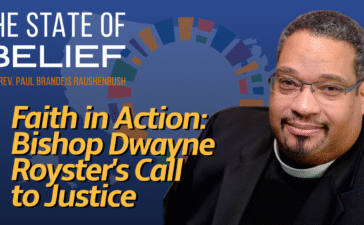(RNS) — What would a conversation between Aretha Franklin and the Apostle Paul sound like?
The question may seem random, as the two figures are so different. One is the Queen of Soul, a Memphis native and Detroit icon of R&B and civil rights anthems. The other, Paul, is the foundational apostle whose ancient letters continue to shape Christian theology.
But despite the millennia that separate their worlds, both understood the power of singing. Franklin channeled Paul not only through her gospel roots, but in her chart-topping secular anthems, where she fulfilled Paul’s mandate in his Letter to the Ephesians to “sing psalms and hymns and spiritual songs.”
As we approach the seventh anniversary of Franklin’s death at the age of 76 on Aug. 16, her commercial success overshadows the revolutionary spiritual message in her music. Franklin’s music was and is both a comprehensive spiritual practice and a tool for social change. It blurred the boundaries between the sacred and profane. Her powerful voice and her artistry translated Paul’s ancient wisdom into a contemporary language that extended beyond the confines of a church.
Paul’s directive to “sing psalms, hymns, and spiritual songs” offers a richer view of group singing than we in the Christian tradition often consider. He wrote it to unify Christian believers in Ephesus, a bustling Roman city where various cults and philosophies competed for allegiance. Paul was prescribing a way to build a distinct Christian identity. Singing together, drawing from a shared repertoire of psalms, new Christian hymns and spirit-inspired songs provided a common language and communal bond. Singing was a practical way for this new community to teach, encourage and strengthen faith.
Aretha Franklin embodied all these dimensions, allowing her music to cultivate spiritual experiences for listeners from every walk of life.
The power of singing often surprises us. Singing becomes an invocation, a summoning of the divine. But don’t mistake it for a passive request; singing is a provocation and a disruption. It’s among the most radical acts we can undertake. It shatters our routines and shakes us from our complacency. When we truly sing, something breaks in — a force that dismantles the mundane and the predictable, and by allowing us to encounter the divine, lets us discover ourselves.
Communal singing in Christian worship emphasizes liturgy and established musical forms, but Paul’s directive to sing “among yourselves” points to a more organic, inclusive model. As a church music director, I’ve seen firsthand how singing together transcends reservations and anxieties to become an active expression of community and togetherness.
While vocal skill is valuable, having something to sing about is also equally important. Franklin may have understood this principle implicitly. Her concerts were communal experiences, while her hits “Respect,” which won two Grammys, and her rendition of Sam Cooke’s “A Change Is Gonna Come” became powerful political anthems. Her artistry brought diverse crowds together in the fight for civil rights, often more than her gospel hymns did.
Writing about “Respect” in her 1999 autobiography, Franklin said, “it was the need of a nation, the need of the average man and woman on the street, the businessman, the mother, the fireman, the teacher—everyone wanted respect.” Singing, as Franklin’s own words attest, transforms performance into a form of resistance; singing fostered solidarity and converted individual listeners into the movement that became, as Franklin affirmed, “one of the battle cries of the civil rights movement.”
Franklin, the daughter of the Rev. C.L. Franklin, a civil rights activist and friend of Martin Luther King Jr., was raised in the movement, and she would tour with King and fellow singer and activist Harry Belafonte. “Aretha has been a very socially conscious artist, an inspiration, not just an entertainer,” Jesse Jackson told the Detroit Free Press in the days after her death. In this sense, her popular songs functioned as “spiritual songs” for a nation and their communal impact often eclipsed the reach of many church hymns.
Singing can also deepen our spiritual introspection, and Paul’s instruction to sing “in your hearts” highlights the introspective dimension of singing. In Pauline theology, the “heart” often signifies the core of one’s being — the seat of intellect, emotion and spiritual understanding. Singing “in the heart” suggests that true spiritual song begins not on the lips but shapes thoughts and emotions. This perspective resonates with contemplative traditions, which view singing as a way to cultivate inner stillness and align with the divine.
Aretha’s music exemplifies this interior transformation through raw emotion and sheer vocal prowess, inviting listeners into a space of introspection and conviction.
Paul’s call to sing “at all times and for everything” is about when and what to sing. Song can reach the full range of human experience, as we see in the lament psalms, which provide voice for emotions such as sorrow, doubt and anger. We can recognize the complexity of the human condition by embracing lament in singing with the intention of finding some sort of solace through the expression of song. Singing is certainly not reserved only for moments of joy.
Franklin tapped into this mode as well. Her 1972 live album, “Amazing Grace,” became the top-selling live gospel album of all time, serving as a source of reassurance and recommitment for a nation reeling from the losses of leaders like Martin Luther King Jr., Malcolm X and Bobby Kennedy, while still embroiled in war.
On her death in 2018, President Barack Obama noted Franklin’s ability to transform hardship into hope, saying in a statement, “In her voice, we could feel our history, all of it and in every shade — our power and our pain, our darkness and our light, our quest for redemption and our hard-won respect. She helped us feel more connected to each other, more hopeful, more human. And sometimes she helped us just forget about everything else and dance.”
Franklin’s influence defied other divides besides the sacred and the secular. As Reiland Rabaka explained, “African Americans have created music that essentially has one meaning within the Black community and perhaps a separate, qualitatively different meaning once it leaves the community.”
Indeed, African American musicians have a rich history of crafting music that addresses complex social and political issues, from slavery and Jim Crow to systemic racism and police brutality. Through their personal social activism and their art, these musicians have consistently inspired hope and unity while rallying people to action.
This tradition of resistance through song began during the earliest days of slavery and has continued to the present day, as exemplified by performances like Kendrick Lamar’s at the 2025 Super Bowl halftime show. Music acts as both a provocateur — challenging people by sparking discussion — and an animateur — motivating people toward collective action.
This breaking of conventional boundaries is precisely where the Apostle Paul and Aretha Franklin meet. While Aretha doesn’t perfectly align with Paul’s mandate, her music reveals the enduring and adaptable wisdom within his call to sing. I believe Aretha demonstrates how spiritual songs can emerge even from secular corners of our culture.
(Jason D. Thompson is pastor of Sacramento’s St. Andrews AME Church, the oldest historically Black congregation on the West Coast, and teaches at the Black Honors College at Sacramento State University. The views expressed in this commentary do not necessarily reflect those of Religion News Service.)






